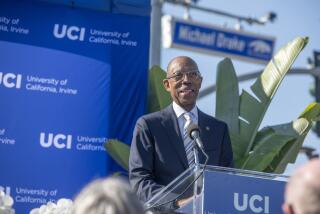UC Defends Race, Gender Preferences : Education: System’s president, chancellors and academic senate leaders call affirmative action a success. They urge regents not to end it.
University of California President Jack W. Peltason, joined by the nine UC chancellors and the leaders of the university’s academic senate, expressed strong support for affirmative action Monday and called for the continuation of UC’s “30-year commitment to the twin goals of diversity and excellence.”
In a letter to the UC Board of Regents, and in an advance text of a speech he plans to deliver at the regents’ meeting next week, Peltason acknowledged that the regents’ recent review of UC’s use of race and gender preferences has shown that some modifications are needed.
But overall, Peltason said, UC’s “race-attentive” affirmative action programs are sound and worth defending. To dismantle them, as some regents have proposed, would be wrong, he said.
“My position is clear, as is that of the entire academic and administrative leadership of the university,” Peltason said. “Our affirmative action and other diversity programs, more than any other single factor, have helped us prepare California for its future. . . . To abandon them now would be a grave mistake for the university and for California.”
Peltason is one of 26 voting members on UC’s governing Board of Regents, who will meet July 20 to consider altering UC’s affirmative action policies. Last week, several other regents made their proposals public.
As university president, Peltason will have to implement any changes the board dictates in affirmative action policies.
Already, Peltason said he has taken steps to modify some admissions policies that he felt were either inappropriate or outdated.
At UC Berkeley and UCLA--the system’s most popular campuses--he ordered officials to give all eligible applicants for undergraduate slots a more comprehensive review. Currently, those campuses give special attention to applications from students who are members of underrepresented minorities.
Peltason has also told officials at UC Davis and UC Irvine to discontinue their practice of automatically admitting all black and Latino applicants who meet the academic qualifications. All the other campuses stopped guaranteeing spots to all eligible underrepresented minorities in the late 1980s.
Regent Ward Connerly has proposed that UC no longer use “race, religion, gender, color, ethnicity or national origin” as criteria in its hiring and contracting practices as of Jan. 1, 1996. University admissions officials would be forbidden to consider those factors beginning the next year, unless applicants could prove that race or other factors had been barriers to success.
Connerly also recommended that UC increase the ratio of students admitted solely on the basis of academic achievement to between 50% and 75%. Currently, the university admits 40% to 60% on academic criteria alone, with the remainder admitted on both scholastic and supplemental factors.
On the heels of Connerly’s recommendations, Gov. Pete Wilson announced that he would attend the regents’ meeting next week to vote to end race- and gender-based preferences and to urge other regents to do the same. As governor, Wilson serves as president of the regents.
Regent Ralph C. Carmona, meanwhile, proposed that the board postpone its vote indefinitely. Carmona, who is a strong supporter of race- and gender-based preferences, said it was premature to vote before November, 1996, when voters are expected to consider at least one initiative that seeks to prohibit race-based preferences.
Peltason echoed this sentiment Monday, cautioning that for UC to act now on affirmative action would be to “run the risk of appearing to involve the university unnecessarily in a politically divisive issue.”
“We will obviously abide by the will of the people,” Peltason’s statement said. “But we should not be presumptuous and assume we already know what the will of the people is.”
In anticipation of next year’s election, when voters may decide to amend the state Constitution to limit affirmative action, Peltason recommended that the regents consult now with UC’s faculty to determine how the university would adapt. Eliminating race and ethnicity from UC’s admissions programs, he said, would be a complicated and time-consuming process that must involve the faculty and the chancellors “at every step.”
Peltason’s comments appeared to be in response to a letter that Connerly sent to all the regents last week, suggesting that the board act without soliciting the views of the faculty. “This is not a matter where we need to consult the faculty before taking action,” the letter said.
Peltason joined with Connerly, however, in calling for more “outreach” efforts to increase the number of black and Latino students who are eligible for UC, and said he will seek the board’s authorization to ask the state to increase funding for those programs.
On Monday, UC’s chancellors, vice presidents and academic leaders issued their own statements urging the preservation of affirmative action programs.
Noting UC’s duty to produce California’s future leaders--graduates who can “negotiate the complexities of a global economy and multicultural world”--the chancellors and vice presidents said that “cultivating a campus community of diverse ethnicities, ideas, cultures, talents, races, interests and values must remain at the center of the university’s obligation to the state and the nation.”
More to Read
Sign up for Essential California
The most important California stories and recommendations in your inbox every morning.
You may occasionally receive promotional content from the Los Angeles Times.










